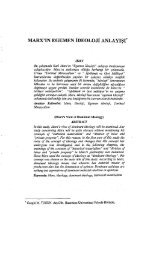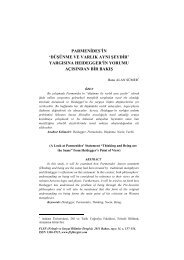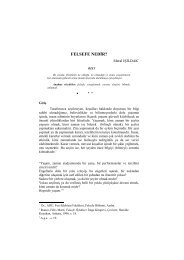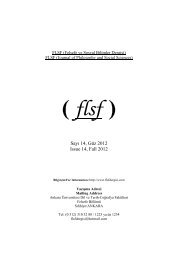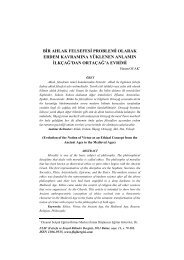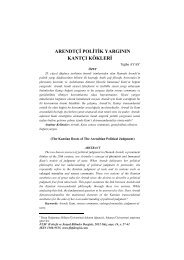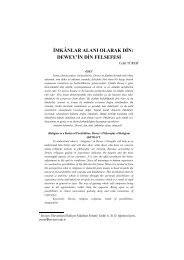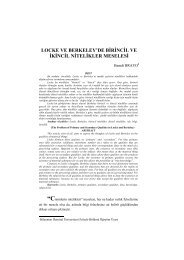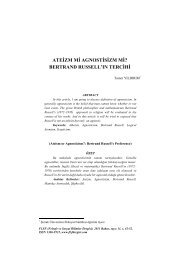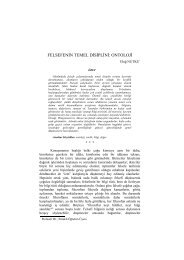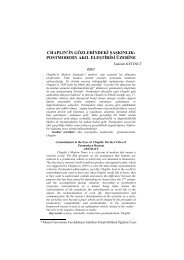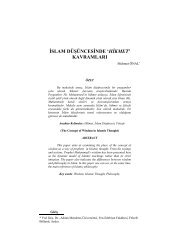Kuramdan Bağımsız Gözlem Ve Deney Dili Olanaklı Mıdır
Kuramdan Bağımsız Gözlem Ve Deney Dili Olanaklı Mıdır
Kuramdan Bağımsız Gözlem Ve Deney Dili Olanaklı Mıdır
You also want an ePaper? Increase the reach of your titles
YUMPU automatically turns print PDFs into web optimized ePapers that Google loves.
42<br />
<strong>Kuramdan</strong> <strong>Bağımsız</strong> <strong>Gözlem</strong> <strong>Ve</strong> <strong>Deney</strong> <strong>Dili</strong> <strong>Olanaklı</strong> <strong>Mıdır</strong>?<br />
dünyaya bakmanın yollarıdır ve kabul görmüş kuramlar kanı ve<br />
beklentilerimizi etkiler; dolayısıyla deneyimlerimiz de bundan etkilenir.<br />
Bilimsel çalışma için araştırmacıya, hangi verileri toplayacağını ve<br />
bunları nasıl yorumlayacağını gösteren kabul edilmiş kuramlar öbeğine<br />
ihtiyaç vardır. Böylece bu düşünürler bağımsız bir gözlem dilinin<br />
varlığını yadsırlar ve bilimde insanın değer ve ilkelerini de hesaba<br />
katarlar. Son tahlilde, kuramdan bağımsız gözlem ve deney dilinin<br />
olanaklı olamayacağını savunan Koyré, Meyerson ve Kuhn’un öne<br />
sürdüğü fikir ve argümanlar, Duhem’e düşülen bir dipnottan başka bir<br />
şey değil gibi görünmektedir.<br />
* * *<br />
(Can There Be Any Dictionary of Observation and<br />
Experiment Apart From A Theory?)<br />
ABSTRACT<br />
Contrary to positivism, which does not take into consideration the<br />
some other aspects of scientific activity and of the history of science, some<br />
leading philosophers and historians of science like Piere Duhem, Émile<br />
Meyerson, Alexandre Koyré and Thomas Kuhn have dealt with the<br />
important discoveries and developments within the history of science<br />
without a positivistic attitude. These thinkers have defended the views that<br />
scientific activity is a theoretical one,which determines the facts and the<br />
structure of observation and experiment, and that theory-ladenness of<br />
observation and experiment precedes everything in science, and that<br />
theories are in fact dictinionaries to guide and help the scientists. Thus,<br />
there is an ontology or an idea of universe above all on which the<br />
scientific activity depends. Accordingly, there have always been different<br />
kinds of ideas of science in different periods in the history of science. In<br />
this presentation, it is aimed at spelling out that the arguments put<br />
forward by Koyré, Meyerson and Kuhn, who intentionally struggled with<br />
positivist movement so as to get rid of it by stating that “it is unlikely to<br />
get a language of observation and experiment free from a theory”, are<br />
nothing but a footnote to Duhem.<br />
Keywords: Theory, observation, experiment, positivism, ontology,<br />
history of science<br />
Kaynakça<br />
DUHEM, Pierre. The Aim and Structure of Physical Theory, Princeton:<br />
Princeton University Press, 1954<br />
DUHEM, Pierre. Essays in the History and Philosophy of Science, (çev.<br />
Roger Ariew and Peter Barker), Indianapolis&Cambridge:<br />
Hackett Publishing Company INC, 1996



